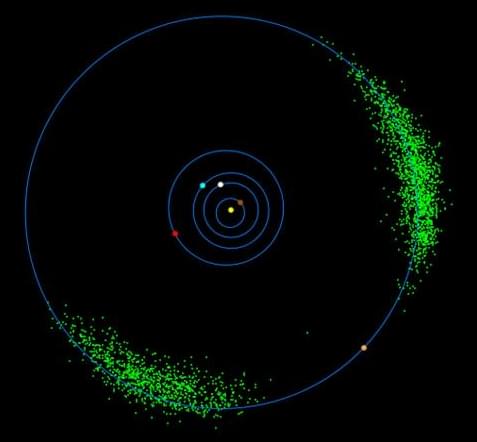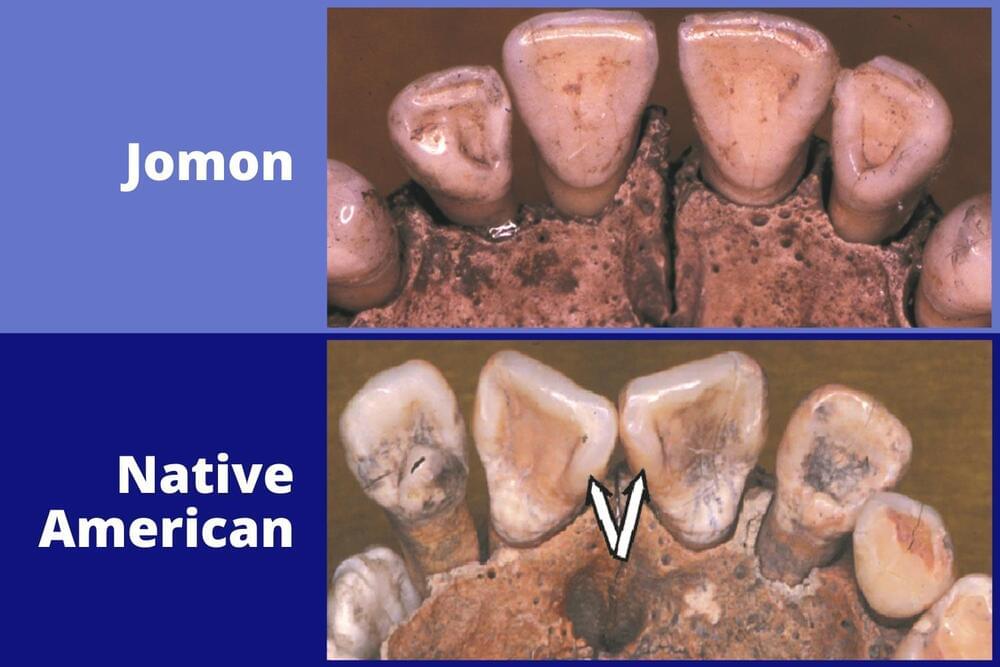While SpaceX has soared, Boeing has had to wait it out.
After a software malfunction prevented the Boeing Starliner from docking with the ISS in 2,020 NASA and Boeing look to 2022 for launch.


In this post I outline my journey creating a dynamic NFT on the Ethereum blockchain with IPFS and discuss the possible use cases for scientific data. I do not cover algorithmic generation of static images (you should read Albert Sanchez Lafuente’s neat step-by-step for that) but instead demonstrate how I used Cytoscape.js, Anime.js and genomic feature data to dynamically generate visualizations/art at run time when NFTs are viewed from a browser. I will also not be providing an overview of Blockchain but I highly recommend reading Yifei Huang’s recent post: Why every data scientist should pay attention to crypto.
W h ile stuck home during the pandemic, I’m one of the 10 million that tried my hand at gardening on our little apartment balcony in Brooklyn. The Japanese cucumbers were a hit with our neighbors and the tomatoes were a hit with the squirrels but it was the peppers I enjoyed watching grow the most. This is what set the objective for my first NFT: create a depiction of a pepper that ripens over time.
How much of the depiction is visualization and how much is art? Well that’s in the eye of the beholder. When you spend your days scrutinizing data points, worshiping best practices and optimizing everything from memory usage to lunch orders it’s nice to take some artistic license and make something just because you like it, which is exactly what I’ve done here. The depiction is authentically generated from genomic data features but obviously this should not be viewed as any kind of serious biological analysis.

Tesla (NASDAQ: TSLA) shareholders voted overwhelmingly to retain Kimbal Musk, brother of CEO Elon Musk, and James Murdoch on Tesla’s Board of Directors, according to an 8-K filing with the SEC that revealed the number of votes to re-elect the two to the company’s Board for three more years.
On October 13th, Tesla filed an 8-K form with the SEC that revealed the number of votes that supported or were against the re-election of both Kimbal Musk and James Murdoch to the Tesla Board. The number of votes for other proposals was also revealed. However, prior to the company’s 2021 Shareholder Meeting on October 7th, proxy advisory firm Institutional Shareholder Services, or ISS, urged Tesla investors to oust both Musk and Murdoch from the Board. Their reasoning was based on the belief that the two non-executive board members did not present any advantages to the automaker’s governance.
“Votes AGAINST directors James Murdoch and Kimbal Musk are warranted due to concerns regarding excessive compensation to named executive officers and to non-executive directors,” ISS wrote in a note to investors. The firm was adamant that Kimbal’s payout package was not necessarily logical for the company as he did not serve on any board committees. Additionally, ISS felt that Murdoch’s presence on the Tesla Board of Directors also was not justified due to his service on Audit and Governance Committees. The Audit Committee pledged a large sum of company stock to directors, which raised questions regarding its risk oversight. The Governance Committee failed to react appropriately to last year’s Shareholder proposal, which was supported by the majority of voters.

NASA has launched the first ever spacecraft to visit Jupiter’s Trojan asteroids.
The Lucy mission successfully blasted off at 5:34 a.m. EDT (9:34 a.m. UCT) this morning on a United Launch Alliance (ULA) Atlas V rocket from Space Launch Complex 41 at Cape Canaveral, Florida. An hour later, it returned its first signal to Earth, sent from its own antenna to NASA’s Deep Space Network. Lucy is now travelling at 108,000 kph (67,000 mph) on a trajectory that will orbit the Sun and bring it back toward Earth in October 2022 for a gravity assist.
Over the next 12 years, it will fly past a total of seven different asteroids – a main belt asteroid, along with six Jupiter Trojans. The latter type are asteroids that share Jupiter’s orbit around the Sun, orbiting either ahead of or behind the gas giant.
Many people reject scientific expertise and prefer ideology to facts. Lee McIntyre argues that anyone can and should fight back against science deniers.
Watch the Q&A: https://youtu.be/2jTiXCLzMv4
Lee’s book “How to Talk to a Science Denier” is out now: https://geni.us/leemcintyre.
“Climate change is a hoax—and so is coronavirus.” “Vaccines are bad for you.” Many people may believe such statements, but how can scientists and informed citizens convince these ‘science deniers’ that their beliefs are mistaken?
Join Lee McIntyre as he draws on his own experience, including a visit to a Flat Earth convention as well as academic research, to explain the common themes of science denialism.
Lee McIntyre is a Research Fellow at the Center for Philosophy and History of Science at Boston University and an Instructor in Ethics at Harvard Extension School. He holds a B.A. from Wesleyan University and a Ph.D. in Philosophy from the University of Michigan (Ann Arbor). He has taught philosophy at Colgate University (where he won the Fraternity and Sorority Faculty Award for Excellence in Teaching Philosophy), Boston University, Tufts Experimental College, Simmons College, and Harvard Extension School (where he received the Dean’s Letter of Commendation for Distinguished Teaching). Formerly Executive Director of the Institute for Quantitative Social Science at Harvard University, he has also served as a policy advisor to the Executive Dean of the Faculty of Arts and Sciences at Harvard and as Associate Editor in the Research Department of the Federal Reserve Bank of Boston.
This talk was recorded on 24 August 2021.
–

This week, Microsoft and Nvidia announced that they trained what they claim is one of the largest and most capable AI language models to date: Megatron-Turing Natural Language Generation (MT-NLP). MT-NLP contains 530 billion parameters — the parts of the model learned from historical data — and achieves leading accuracy in a broad set of tasks, including reading comprehension and natural language inferences…
This content isn’t available right now.
When this happens, it’s usually because the owner only shared it with a small group of people, changed who can see it or it’s been deleted.

Similar to the relationship between an engine and oil, data and artificial intelligence (AI) are symbiotic. Data fuels AI, and AI helps us to understand the data available to us. Data and AI are two of the biggest topics in technology in recent years, as both work together to shape our lives on a daily basis…
This content isn’t available right now.
When this happens, it’s usually because the owner only shared it with a small group of people, changed who can see it or it’s been deleted.
This is a #robot that walks, flies, #skateboards, #slacklines, and might do much more one day. A portion of this video was sponsored by Bluehost. Start building a website with Bluehost today. Use my link to receive more than 65% off: https://bluehost.com/track/veritasium #Bluehost #BHcreator.
Thanks to Prof. Soon-Jo Chung and everyone at the Aerospace Robotics and Control Lab at Caltech for the tour!
https://aerospacerobotics.caltech.edu/
▀▀▀▀▀▀▀▀▀▀▀▀▀▀▀▀▀▀▀▀▀▀▀▀▀▀
References:
Kim, K., Spieler, P., Lupu, S., Ramezani, A., Chung, S. (2021). A bipedal walking robot that can fly, slackline, and skateboard. Science Robotics. — https://www.science.org/doi/10.1126/scirobotics.abf8136
▀▀▀▀▀▀▀▀▀▀▀▀▀▀▀▀▀▀▀▀▀▀▀▀▀▀
Special thanks to Patreon supporters: S S, Andrew, Benedikt Heinen, Diffbot, Micah Mangione, MJP, Gnare, Dave Kircher, Edward Larsen, Burt Humburg, Blake Byers, Dumky, Evgeny Skvortsov, Meekay, Bill Linder, Paul Peijzel, Mac Malkawi, Michael Schneider, Big Badaboom, Ludovic Robillard, jim buckmaster, Juan Benet, Ruslan Khroma, Robert Blum, Richard Sundvall, Lee Redden, Vincent, Marinus Kuivenhoven, Alfred Wallace, Clayton Greenwell, Michael Krugman, Cy ‘kkm’ K’Nelson, Sam Lutfi, Ron Neal.
▀▀▀▀▀▀▀▀▀▀▀▀▀▀▀▀▀▀▀▀▀▀▀▀▀▀
Written by Derek Muller.
Filmed by Derek Muller, Trenton Oliver, and Emily Zhang.
Edited by Trenton Oliver.
Produced by Derek Muller, Petr Lebedev, and Emily Zhang.

AI can detect signals that are informative about mental health from questionnaires and brain scans.
A study published today by an interdisciplinary collaboration, directed by Denis Engemann from Inria, demonstrates that machine learning from large population cohorts can yield “proxy measures” for brain-related health issues without the need for a specialist’s assessment. The researchers took advantage of the UK Biobank, one of the world’s largest and most comprehensive biomedical databases, that contains detailed and secure health-related data on the UK population. This work is published in the open access journal GigaScience.
Mental health issues have been increasing worldwide, with the WHO determining that there has been a 13% increase in mental health conditions and substance abuse disorders between 2007 and 2017. The burden these diseases place on society is extensive, negatively impacting nearly every area of life: school, work, family, friends, and community engagement. Among the many issues impeding the ability of society to address these disorders is that diagnoses of such health issues requires specialists; the availability of which ranges drastically across the globe. The development of machine learning methodology for the purposes of facilitating mental-health assessments could provide a much needed additional means to help detect, prevent and treat such health issues.

Latest scientific findings suggest the ancestral Native American population does not originate in Japan, as believed by many archaeologists.
A widely accepted theory of Native American origins coming from Japan has been attacked in a new scientific study, which shows that the genetics and skeletal biology “simply does not match-up.”
The findings, published on October 12 2021, in the peer-reviewed journal PaleoAmerica, are likely to have a major impact on how we understand Indigenous Americans’ arrival to the Western Hemisphere.